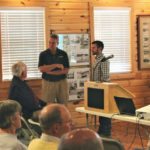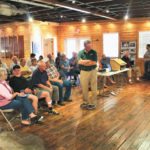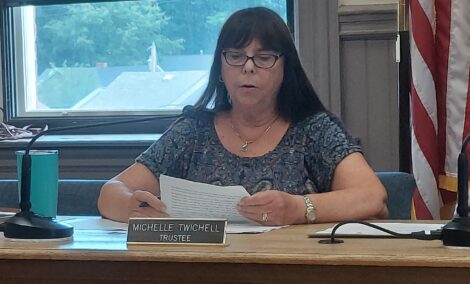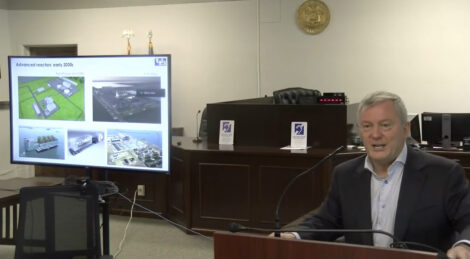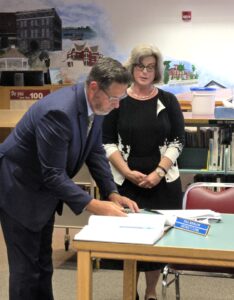Reel Opportunities
Lake Fishery Discussed In Lawson Lecture Series
- Pictured, from left, are Paul McKeown and Justin Brewer from the state Bureau of Fisheries. The Lawson Center continued its lecture series Wednesday in Bemus Point on the state of fishing on the lake. Photo by Jordan Patterson
- Photo by Jordan Patterson
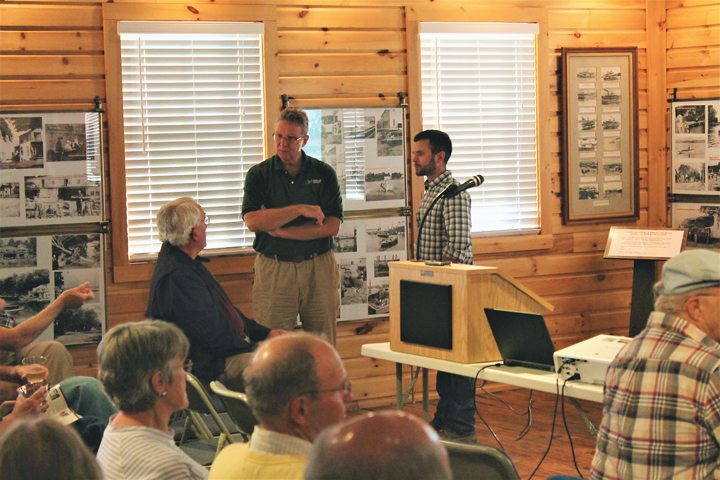
Pictured, from left, are Paul McKeown and Justin Brewer from the state Bureau of Fisheries. The Lawson Center continued its lecture series Wednesday in Bemus Point on the state of fishing on the lake. Photo by Jordan Patterson
BEMUS POINT — The Lawson Center Lecture Series was back for its fourth talk this summer.
Wednesday’s guest speakers featured Justin Brewer and Paul McKeown from the NYS DEC Bureau of Fisheries in a segment called “Chautauqua Lake Fishery: Past, Present and Future.”
The focus of the duo’s lecture was the status of the lake’s fisheries. McKeown, former biologist of Chautauqua Lake, was optimistic that Chautauqua Lake was in a position to maintain its healthy status and could even get better, depending on a variety of circumstances. The fish that would be prominent in their lecture were, bass, walleye and muskellunge.
“(The lake) has been in good shape going on 20 years now,” McKeown said.
Brewer, the current biologist of Chautauqua Lake, said that the status of the lake was at a “phenomenal place.”
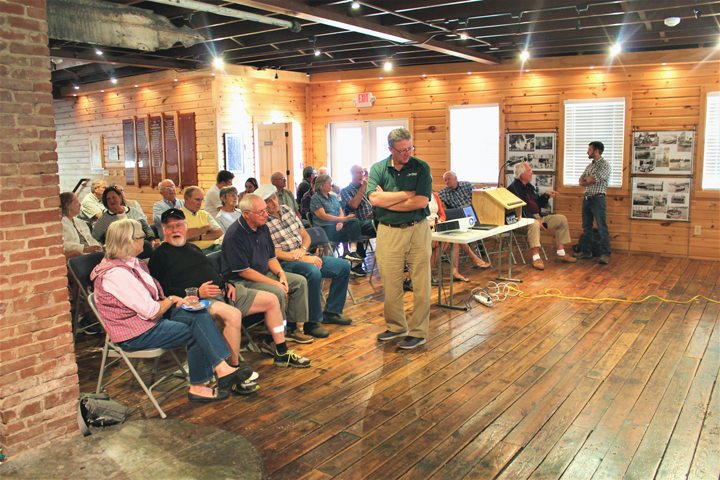
Photo by Jordan Patterson
He alluded to the status of the bass, walleye and muskellunge, all of which are on an increase from the previous year. Brewer pointed to 2014 and 2015 when there was an increase in natural reproduction in the lake for walleye. Also, regulations set in 1979 on the lake allowed fish to live in a safer and healthier habitat for the muskellunge to thrive. He also noted that bass and pan fish populations are slightly increasing, as well.
“The populations are doing extremely well,” Brewer said. “(The lake) is a high class, multi-species fishery. It’s important to get the word out.”
McKeown praised the Lawson Center Lecture series and said that both parties involved benefit.
“Education is always good,” McKeown said. “It helps (the community) make decisions if they’re more informed and it helps (the DEC), also. Our sampling programs don’t give us all the answers, we get information from these types of gatherings.”
Lawson Center trustee Sharon Graper expressed enthusiasm about having Brewer and McKeown come speak at the Lawson Center about fishing.
“One of the major sports on the lake are the fishermen,” Graper said. “So, you know, the museum isn’t just about boats but about the lake and people use the lake. So, that’s everything from recreational usages of sport boating to fishing to ice fishing to using it for pontoon planes.”
Graper’s biggest interest in the speakers from Wednesday night was that it would bring people who might not typically visit the museum and emphasized that the Lawson Center isn’t just about boats.
“We don’t want them to think it’s just about antique boats,” Graper said of the Lawson Center and its lecture series. “We’re trying to really hit all different populations of people because I think people use the lake in different ways.”
The Lawson Lecture Series is only in its second year and took a big leap by expanding its series from two months up to five months, with one lecture per month. Graper noted that despite the big jump, the Lawson Center has maintained around an estimated 60 person per lecture average, this year.
The last lecture is in September and it will close out the lecture series for 2017. While the 2017 lecture series isn’t over yet, this hasn’t stopped Graper from looking for inspiration for next year. Graper noted that one of their members recently published a book about how a Chris-Craft factory existed in Falconer for a short period of time. Graper hinted that one of the lectures could feature a historian as a guest speaker for one of the months next year.
The Lawson Lecture Series continues this month with the focus shifting to the Lawson Center specifically. The discussion will be about the boat shop that is below the museum. Members of the Lawson Center will talk about how they go about fixing boats they acquire and how they go about selling them if they have no need for a particular boat.
In the shop, there a numerous people who work on boats but the Lawson Center also gets donated boats from various people. Members of the Lawson Center can rent space and work boats, as well.
The Lawson Center Museum will open its doors for the final installment of the lecture series for 2017 on Sept. 30.

